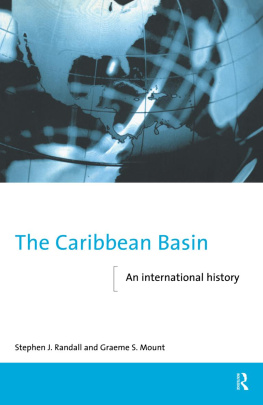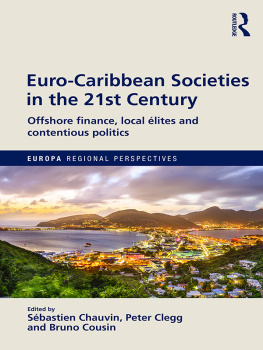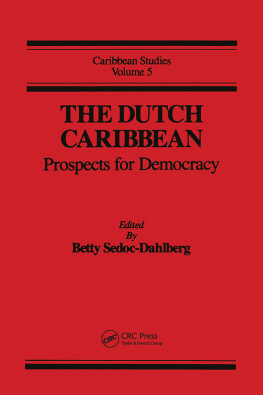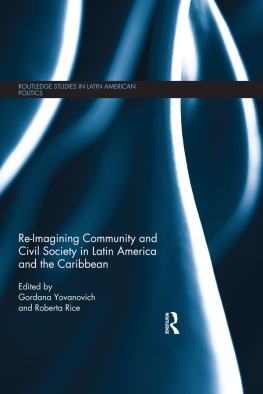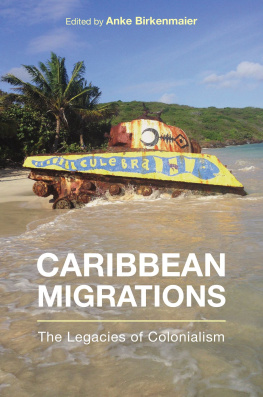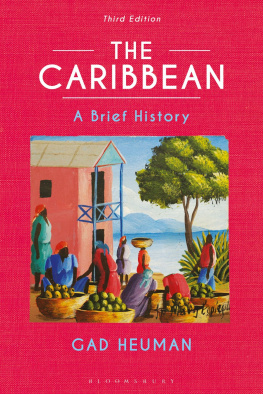
The Social Roles of Sport in Caribbean Societies
CARIBBEAN STUDIES
A series of books edited by Roberta Marx Delson, Jay R. Mandle, and Joan D. Mandle
VOLUME 1
READINGS IN CARIBBEAN HISTORY AND ECONOMICS
Edited by Roberta Marx Delson
VOLUME 2
PATTERNS OF CARIBBEAN DEVELOPMENT
An Interpretive Essay on Economic Change
Jay R. Mandle
VOLUME 3
URBAN LIFE IN KINGSTON, JAMAICA
The Culture and Class Ideology of Two Neighborhoods
Diane J. Austin
VOLUME 4
RACE, POWER AND SOCIAL SEGMENTATION IN COLONIAL SOCIETY
Guyana After Slavery, 18381891
Brian L. Moore
VOLUME 5
THE DUTCH CARIBBEAN
Prospects for Democracy
Edited by Betty Sedoc-Dahlberg
VOLUME 6
MASS MEDIA AND THE CARIBBEAN
Edited by Stuart H. Surlin and Walter C. Soderlund
VOLUME 7
TRADE ISSUES IN THE CARRIBEAN
Edited by Irma Tirado de Alonso
VOLUME 8
CARIBBEAN HOOPS
The Development of West Indian Basketball
Jay R. Mandle and Joan D. Mandle
VOLUME 9
THE SOCIAL ROLES OF SPORT IN CARIBBEAN SOCIETIES
Edited by Michael A. Malec
This book is part of a series. The publisher will accept continuation orders which may be cancelled at any time and which provide for automatic billing and shipping of each title in the series upon publication. Please write for details.
The Social Roles of Sport in Caribbean Societies
Edited by
Michael A. Malec
Boston College
Massachusetts
Copyright 1995 by OPA (Overseas Publishers Association) Amsterdam B.V. Published under license by Routledge
All rights reserved.
No part of this book may be reproduced or utilized in any form or by any means, electronic or mechanical, including photocopying and recording, or by any information storage or retrieval system, without permission in writing from the publisher.
Published by Routledge
2 Park Square, Milton Park, Abingdon, Oxon, OX14 4RN
270 Madison Ave, New York NY 10016
Transferred to Digital Printing 2008
Originally published in 1990 in volume 14, number 1 of The Arena Revue, Boston College, Massachusetts.
British Library Cataloguing in Publication Data
Social Roles of Sport in Caribbean
Societies. - (Caribbean Studies, ISSN 0275-5793;Vol. 9)
I. Malec, Michael A. II. Series
306.48309729
ISBN 2-88449-134-1 (hardcover)
2-88449-135-X (softcover)
Publishers Note
The publisher has gone to great lengths to ensure the quality of this reprint but points out that some imperfections in the original may be apparent
To Myrna
my favorite partner
tennis and otherwise
CONTENTS
Michael A. Malec
Kevin A. Yelvington
Maurice St. Pierre
Christine Cummings
Beverley J. Anderson
Alan M. Klein
Roy L. Austin
Roy Derek McCree
Jay R. Mandle and Joan D. Mandle
John Sugden, Alan Tomlinson, and Eamon McCartan
John R. Mitrano and Robbin E. Smith
The purpose of this series is to provide a forum in which the major themes and trends affecting the entire Caribbean region will be explored in depth. Thus, while the island-specific approach in not eschewed, the aim is to develop perspectives on problem-solving in the area as an entirety, both on the local level and in the international context. Hence the emphasis is on the qualitative and quantitative interpretation of the economic and political culture in which the modern Caribbean operates. Historical, demographical and sociological issues, when relevant to the central focus of the series, will also be examined.
Caribbean Studies publishes the research of academic scholars working within the region, as well as Caribbeanists working internationally. Simultaneously, it is hoped that the volumes function as a reference data source for libraries, foundations and government agencies with an interest in the Caribbean, either exclusively or peripherally.
It is the editors hope that the series will increase comprehensive Caribbean studies internationally and will similarly stimulate innovative research and development of methodology suitable to comparative perspectives. Only when the Caribbean is evaluated in its broadest panorama can the true global importance of the region be appreciated.
PREFACE
Little has been written about sports in the Caribbean from the perspectives of the social sciences. In this volume, scholars from the fields of anthropology, economics, government, and sociology cast their critical eyes on the social institution of sport as it exists in the Caribbean. Baseball, basketball, cricket, football, horse racing, and other sports are examined. The paragraphs below give the reader some idea of what will follow.
Half of the articles in this volume are reproduced with only minor changes from the May 1990 issue of The Arena Revue (vol. 14, no. 1). The others (notably those by Anderson, Cummings, McCree, St. Pierre, and Yelvington) have been considerably revised and updated. Michael A. Malecs opening comments set the stage by discussing how social scientists might view sport as a social institution. This chapter shows how sport is connected to other aspects of societyrace, politics, cultureand provides a sense of some different social science perspectives on sport.
The next three articles focus on what some would describe as the national sport of the Caribbeancricket. Kevin A. Yelvington begins this section by looking at the role of cricket in the colonial and postcolonial Caribbean. Tackling the flourishing theme in anthropology of the nature of culture under colonialism, he pushes the agenda of the study of the culture of colonialism forward in four main directions. First, he looks at a relatively neglected subject in this genre, the role of sport and games generally. Second, rather than an exclusive focus on colonialism per se, Yelvington considers the links between colonialism and its legacies in order to explicate both cultural-political forms. Third, by implication, this entails a consideration of the postcolonial order, which everywhere in the postcolonial world is stamped with nationalism. And finally, he assesses the role sport plays in the resistance to colonialism. As a case study to illuminate these theoretical concerns the author uses ethnic politics in postcolonial Trinidad and Tobago and the 1976 Indian cricket tour to the Caribbean. He shows the ways in which sport becomes used in purveying postcolonial nationalism and, conversely, the ways in which sport is used as a means of cultural and political resistance.
In , Maurice St. Pierre examines West Indian cricket against the backdrop of Durkheims notion of a social fact. Accordingly, the adaptation hypothesis that views crickets acceptance in the West Indies as primarily the result of its imposition from above, that is by the colonial power, is rejected in favor of the argument that the game reflects many basic values and practices which are endemic in the regions cultural fabric. Crickets continuing and increasing popularity, St. Pierre argues, is explainable not merely as a syncretic variant of West Indian culture, but also because it satisfies a number of needs for the masses, players, and politicians, as well as the former colonial power.


